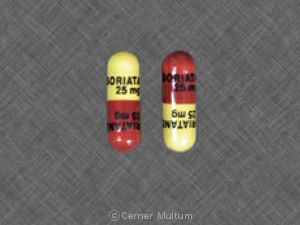Soriatane CK Disease Interactions
There are 9 disease interactions with Soriatane CK (acitretin).
- Hyperlipidemia
- Liver disease
- Renal dysfunction
- Intracranial hypertension
- Psychiatric disorders
- Alcoholism
- Diabetes
- Ophthalmologic effects
- Liver disease
Acitretin (applies to Soriatane CK) hyperlipidemia
Major Potential Hazard, Moderate plausibility. Applicable conditions: Obesity
Acitretin is contraindicated in patients with chronic abnormally elevated blood lipid values. It is recommended to evaluate lipid status in patients before initiation of therapy and periodically until the lipid response to the drug is established. Care should be taken in subjects with an increased tendency to develop hypertriglyceridemia included those with disturbances of lipid metabolism, obesity, or a familial history of these conditions. Serum lipids must be more closely monitored in high-risk patients and during long-term treatment with acitretin. Dietary modifications, reduction in dose of acitretin, or drug therapy should be employed to control significant elevations of triglycerides, and if hypertriglyceridemia and low HDL levels persist, discontinuation of acitretin should be considered.
Acitretin (applies to Soriatane CK) liver disease
Major Potential Hazard, Moderate plausibility.
The use of retinoids has been associated with elevations in liver enzymes and toxic hepatitis. Therapy with acitretin is contraindicated in patients with severely impaired liver function.
Acitretin (applies to Soriatane CK) renal dysfunction
Major Potential Hazard, Moderate plausibility.
The use of acitretin has been associated with significant lower plasma concentrations in patients with end-stage renal failure. Therapy with acitretin is contraindicated in patients with severely impaired kidney function. It is recommended to monitor renal function as per clinical guidelines. Acitretin is not removed by hemodialysis.
Retinoids (applies to Soriatane CK) intracranial hypertension
Major Potential Hazard, High plausibility.
The use of retinoids has been associated with cases of pseudotumor cerebri (benign intracranial hypertension). Early signs and symptoms include papilledema, headache, nausea and vomiting, and visual disturbances. Patients who experience symptoms of this disorder while on retinoid therapy should be referred to a neurologist. If the diagnosis is confirmed, the retinoid should be discontinued permanently.
Retinoids (applies to Soriatane CK) psychiatric disorders
Major Potential Hazard, Low plausibility. Applicable conditions: Psychosis, Depression
The use of retinoids, primarily isotretinoin, has been associated with causing depression, psychosis and rarely, suicidal ideation. Therapy with retinoids should be administered cautiously in patients with preexisting psychiatric conditions or depression. In addition to withdrawal of therapy, evaluation and follow-up may be necessary in affected patients.
Acitretin (applies to Soriatane CK) alcoholism
Moderate Potential Hazard, High plausibility.
Like other retinoids, acitretin is a teratogen. The concurrent use of alcohol and acitretin has been associated with the formation of etretinate, a related retinoid drug with a considerably longer half-life (mean: 120 days vs. 49 hours). Alcohol should be avoided during acitretin therapy and for two months after completion of therapy in female patients of child-bearing age, since it may prolong the duration of teratogenic potential of the drug.
Acitretin (applies to Soriatane CK) diabetes
Moderate Potential Hazard, Moderate plausibility. Applicable conditions: Diabetes Mellitus
The use of acitretin may adversely affect blood sugar levels and result in problems with blood sugar control. In addition, new cases of diabetes have been diagnosed during retinoid therapy, including diabetic ketoacidosis. It is recommended to monitor blood sugar levels very closely in diabetic patients.
Acitretin (applies to Soriatane CK) ophthalmologic effects
Moderate Potential Hazard, Moderate plausibility. Applicable conditions: Visual Defect/Disturbance
Ophthalmologic manifestations have been reported with the use of acitretin. It is recommended that any patient treated with acitretin who is experiencing visual difficulties should discontinue the drug and undergo ophthalmologic evaluation.
Retinoids (applies to Soriatane CK) liver disease
Moderate Potential Hazard, Low plausibility.
The use of retinoids has been associated with elevations in liver enzymes and toxic hepatitis. Therapy with retinoids should be administered cautiously in patients with liver disease. Monitoring liver enzymes is recommended in these patients.
Switch to professional interaction data
Soriatane CK drug interactions
There are 67 drug interactions with Soriatane CK (acitretin).
Soriatane CK alcohol/food interactions
There are 4 alcohol/food interactions with Soriatane CK (acitretin).
More about Soriatane CK (acitretin)
- Check interactions
- Compare alternatives
- Drug images
- Side effects
- Dosage information
- During pregnancy
- Drug class: antipsoriatics
- Breastfeeding
Related treatment guides
Drug Interaction Classification
| Highly clinically significant. Avoid combinations; the risk of the interaction outweighs the benefit. | |
| Moderately clinically significant. Usually avoid combinations; use it only under special circumstances. | |
| Minimally clinically significant. Minimize risk; assess risk and consider an alternative drug, take steps to circumvent the interaction risk and/or institute a monitoring plan. | |
| No interaction information available. |
See also:
Further information
Always consult your healthcare provider to ensure the information displayed on this page applies to your personal circumstances.


